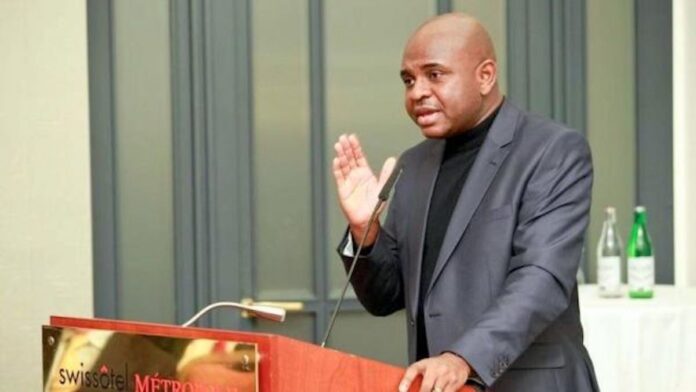By Favour Goodness
A former Deputy Governor of Central Bank of Nigeria (CBN), Prof. Kingsley Moghalu, has blamed Nigeria’s poor COVID-19 recovery on failures of its state capacities.
The immediate past Special Envoy to United Nation Development Programme, (UNDP) Post COVID-19 Development Finance for Africa made known during the launching of a book titled, “Contemporary COVID-19 Experiences in Nigeria.” at Nnamdi Azikiwe University, Awka on Friday.
He said that the Federal Government had failed to rise to its responsibilities especially in protecting the Nigerians and had shown inability to discharge effective service delivery which has hindered the country’s economic recovery from COVID-19 pandemic.
While noting that Nigerians had lost confidence in the ability of the leaders to manage their hard-earned resources, Moghalu, said that the country lacked an effective tax collection formula from the citizens who, he said, were reluctant to contribute to national coffers.
“We need to improve our state capacity which has three main dimensions; the ability of the country to secure its territory, the ability of the state to raise revenue through taxation and ability of the state to deliver administrative services to the people especially in healthcare in the context of COVID-19,” he said.
Describing the nature of the newly launched Book, he said “it is a great contribution to the world of knowledge because it is interdisciplinary and original. It shows original knowledge coming out of Nigeria and I hope that it will impact policymaking in our country so that we can get good governance that the citizens deserve.”
Moghalu who also noted that the country needed to invest more in healthcare and education, said some of the problems bedevilling Africa’s literary production lied in its struggles in globalizing their knowledge.
On his part, the former National Chairman of All Progressive Grand Alliance (APGA), Sen. Victor Umeh, said that COVID-19 pandemic exposed Nigeria’s vulnerability in response to precarious situations like pandemics, stressing that the country did not survive the pandemic for its ingenuity, but for the mercy of God.
Umeh who chaired the occasion commended the research efforts of the book contributors
He deemed the book necessary for posterity, so that future generation would keep abreast with the story of the pandemic in Nigeria.
Earlier, the Editor-in-Chief of the book, Prof. Meshach Umenweke, said the book was a collaborative effort of scholars from Nnamdi Azikiwe and Chukwuemeka Odumegwu Ojukwu Universities, who he said, interrogated issues that evolved within the wave of the pandemic.
Vice-Chancellor, Nnamdi Azikiwe University, Awka, Prof. Charles Esimone, represented by the Deputy Vice-Chancellor (Academic), Prof Frederick Odibo, commended the COVID-19 research network for putting together the literary work for societal consumption.
Reviewing the book, the Anambra State Commissioner for Health, Dr Vincent Okpala, said the book contains 27 Chapters and 414 pages, stressing that its interdisciplinary nature will make it relevant for reference in the future.
Okpala who noted that the paper will help policymakers cushion the harsh effects of COVID-19 in society, also stated that it established ways the country can move forward from a mono-economic base to a diversified economy.



